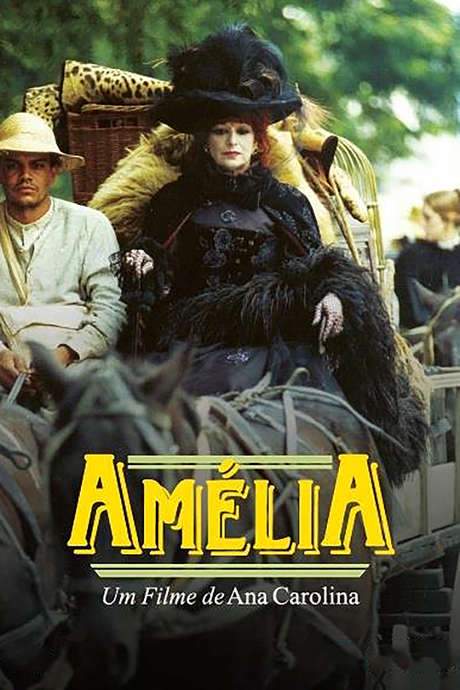Elis 2018

The film portrays the life of Elis Regina, a celebrated Brazilian singer known for her captivating voice and passionate performances. It delves into the challenges she faced both professionally and personally, showcasing the triumphs and struggles of her career. Through a biographical lens, the drama explores the complexities of this iconic artist, revealing the dedication and sacrifices behind her extraordinary talent and lasting legacy in Brazilian music.
Does Elis have end credit scenes?
No!
Elis does not have end credit scenes. You can leave when the credits roll.
Meet the Full Cast and Actors of Elis
Explore the complete cast of Elis, including both lead and supporting actors. Learn who plays each character, discover their past roles and achievements, and find out what makes this ensemble cast stand out in the world of film and television.
External Links and Streaming Options
Discover where to watch Elis online, including streaming platforms, rental options, and official sources. Compare reviews, ratings, and in-depth movie information across sites like IMDb, TMDb, Wikipedia or Rotten Tomatoes.
Ratings and Reviews for Elis
See how Elis is rated across major platforms like IMDb, Metacritic, and TMDb. Compare audience scores and critic reviews to understand where Elis stands among top-rated movies in its genre.

The Movie Echo Score
In overall terms, 'Elis' delivers a visually engaging biographical portrait that is anchored by a compelling central performance yet hampered by uneven narrative cohesion. While the film excels in its picturesque cinematography, authentic period recreation, and vibrant musical set pieces, it often resorts to episodic highlights that omit deeper historical context. The dramatic trajectory occasionally feels fragmented and formulaic, limiting emotional resonance. Ultimately, its strong aesthetic qualities and standout lead performance coexist with a narrative approach that remains only partially satisfying.
The Movie Echo Score Breakdown for Elis

Art & Craft
The film’s visual presentation stands out for its elegant cinematography and meticulous production design. Reviewers praise the period-accurate costumes, evocative color palette, and immersive framing that evoke the Brazilian musical era. However, some responses note a superficial or telefilm-like treatment in dramatic sequences. On balance, the film’s art direction and visual craft remain one of its more compelling attributes.

Character & Emotion
In terms of character and emotion, the film is anchored by a luminous lead performance that captures the energy and presence of its subject. The central portrayal is widely commended for its authenticity, and supporting roles receive occasional praise. Yet the narrative’s episodic structure curtails deeper character exploration and emotional insight. Overall, the film’s acting achievements stand out despite limited character depth.

Story & Flow
When it comes to story and flow, the film presents an episodic progression that highlights key moments but sacrifices narrative coherence. The pacing alternates between engaging sequences and abrupt transitions that can be disorienting. Historical and temporal markers are often assumed rather than clarified, which diminishes context and depth. In summary, while the biopic offers memorable scenes, its storytelling approach feels fragmented and underdeveloped.

Sensory Experience
In terms of sensory experience, the film immerses viewers with a vibrant soundtrack featuring expertly lip-synced performances and compelling sound design. The visual style is bolstered by an understated color palette and thoughtfully composed shots. Occasional critiques point to a somewhat televisual aesthetic, but overall the musical and visual elements provide a rich, engaging sensory landscape.

Rewatch Factor
Regarding rewatch factor, the film’s strong musical sequences and standout lead portrayal encourage repeat viewings for their emotional and aesthetic appeal. However, the uneven pacing and episodic narrative may limit the desire to revisit the story as a whole. Ultimately, the film offers moments of lasting resonance, though its structural gaps constrain sustained replay value.


29%
TOMATOMETER

67%
User Score

6.7 /10
IMDb Rating

73
%
User Score

3.5
From 598 fan ratings
Take the Ultimate Elis Movie Quiz
Challenge your knowledge of Elis with this fun and interactive movie quiz. Test yourself on key plot points, iconic characters, hidden details, and memorable moments to see how well you really know the film.
Elvis: The King and His Journey: Test your knowledge about the life and legacy of Elvis Presley as detailed in the film 'Elvis'.
What pivotal moment opens the movie 'Elvis'?
Colonel Tom Parker succumbs to his mortal coil
Elvis wins his first Grammy
Elvis performs at the International Hotel
Elvis's first meeting with Priscilla
Show hint
Full Plot Summary and Ending Explained for Elis
Read the complete plot summary of Elis, including all major events, twists, and the full ending explained in detail. Explore key characters, themes, hidden meanings, and everything you need to understand the story from beginning to end.
The story opens in 1997 with the passing of Colonel Tom Parker, portrayed by Tom Hanks, igniting a wave of media scrutiny aimed at dissecting his controversial legacy. As his narrative unfolds, he portrays himself as the orchestrator behind the rise of Elvis Presley, the legendary King of Rock and Roll, played by Austin Butler.
Flashing back to the extravagant 1970s in Las Vegas, we find a weary Elvis, struggling to perform at the International Hotel. His devoted team, desperate to revive him, resorts to submerging his head in icy water. Despite the odds, he summons the strength to deliver a breathtaking rendition of “An American Trilogy,” leaving the audience in awe. As Parker reflects on his past during a solitary stroll through a deserted casino, he grapples with the heavy echoes of history and the rumors seeking to taint his reputation.
However, the tale truly begins in the mid-1950s when Parker was just another unknown immigrant at a traveling carnival alongside Hank Snow, whose character is played by David Wenham. Parker’s fortunes shift dramatically with the arrival of Jimmie Rodgers, portrayed by Kodi Smit-McPhee, the son of a famous country singer. Parker is captivated by Jimmie’s unconventional sound, which draws heavily on African-American musical influences, leading him to envision a path that would forever change rock history.
Parker’s narration takes a pivotal turn as he remembers the moment he first encountered Elvis during a radio performance by Hank. A timid young man, spurred on by his mother Gladys, portrayed by Helen Thomson, finally finds the courage to perform. What Parker fails to mention is Elvis’s deep-seated trauma from losing his twin brother Jesse at birth; this pain manifests in his admiration for comic book heroes, embodying strength and escape.
Despite initial ridicule, Elvis captivates the crowd with his unique voice and dynamic dance, triggering a mix of adoration and disapproval among spectators. This unpredictable reaction would define Elvis’s career as he tours the Southern states with Hank’s troupe. Determined to elevate Elvis’s status, Parker joins the tour, recognizing the young artist’s formidable appeal that Hank struggles to appreciate.
Elvis’s quest for success is supported by his family, notably Gladys and Vernon, played by Richard Roxburgh who join him in his endeavors. Through a series of heartfelt moments, Elvis convinces his mother of his potential, despite her own skepticism about the industry. Initially working as a truck driver, he is mesmerized by the brilliance of black musicians on Beale Street. Notably, the performances of BB King, played by Kelvin Harrison Jr., and Big Mama Thornton, portrayed by Shonka Dukureh, ignite his passion for music.
As Elvis’s career flourishes, he moves his family to Graceland, the estate that would become emblematic of his legacy. Amid his rise to fame, Elvis faces a new challenge as his provocative dance moves attract scrutiny. Senator James Eastland, played by Nicholas Bell, leads a campaign against him, demanding he conform to public expectations or else face dire consequences.
Under pressure, Elvis’s management insists on a more conservative image and sound, straining his bond with Gladys, who is grappling with her own demons of alcoholism. In search of solace, Elvis seeks comfort in the company of BB and other musicians, vowing to remain true to himself despite the pressure.
As the tensions escalate, Parker’s attempts to control Elvis are challenged when the star defiantly claims his identity during a high-stakes performance, igniting an audience frenzy that leads to his arrest. By 1958, with whispers of imprisonment looming, circumstances push Elvis to serve in the military, further complicating his relationship with his ailing mother.
While stationed in Germany, Elvis encounters Priscilla Wagner, played by Olivia DeJonge, and their whirlwind romance blossoms amidst global turbulence. The 1960s see Elvis return to America, rejuvenating his acting career while navigating the trials of family life. Together with Priscilla, they welcome daughter Lisa Marie.
Throughout this period, the weight of social issues affects Elvis deeply, particularly the assassination of figures like Dr. Martin Luther King Jr. While Parker suggests it has no connection to their world, Elvis feels the intimate ties to his own struggles. Elvis’s comeback culminates in a celebrated NBC Christmas special, transforming a routine performance into an anthem for social change.
Establishing a stronghold at the International Hotel, a deal brokered by Parker also binds Elvis financially, trapping him in a situation that leads to greater tension between artistic desires and commercial realities. As the allure of fame turns sour, Elvis’s personal life crumbles, highlighted by puppy love and betrayal, especially as Priscilla becomes a distant figure in the chaos of his addiction.
Years later, as Elvis’s health deteriorates and his self-destruction intensifies, resignation sets in. A final on-stage outburst against Parker crystallizes his frustrations, leading to a bitter divorce that ultimately takes a toll on their daughter, Lisa Marie.
In a melancholic climax, 1977 sees Elvis, at just 42, depart from this world, his passing evoking widespread grief and a solemn response from President Jimmy Carter. Colonel Parker reflects on the irony of it all, suggesting that it was not the excesses that took Elvis, but his fervent longing for love and adoration.
By 1997, the repercussions of Parker’s exploitative years set in; his life spirals as legal repercussions follow. In stark contrast, Elvis’s music endures, immortalizing him as one of the highest-selling solo artists, profoundly influencing generations and securing his place in the annals of cultural history.
Uncover the Details: Timeline, Characters, Themes, and Beyond!

Coming soon on iOS and Android
The Plot Explained Mobile App
From blockbusters to hidden gems — dive into movie stories anytime, anywhere. Save your favorites, discover plots faster, and never miss a twist again.
Sign up to be the first to know when we launch. Your email stays private — always.
Watch Trailers, Clips & Behind-the-Scenes for Elis
Watch official trailers, exclusive clips, cast interviews, and behind-the-scenes footage from Elis. Dive deeper into the making of the film, its standout moments, and key production insights.
Elis Themes and Keywords
Discover the central themes, ideas, and keywords that define the movie’s story, tone, and message. Analyze the film’s deeper meanings, genre influences, and recurring concepts.
Elis Other Names and Titles
Explore the various alternative titles, translations, and other names used for Elis across different regions and languages. Understand how the film is marketed and recognized worldwide.
Similar Movies To Elis You Should Know About
Browse a curated list of movies similar in genre, tone, characters, or story structure. Discover new titles like the one you're watching, perfect for fans of related plots, vibes, or cinematic styles.
Quick Links: Summary, Cast, Ratings, More

What's After the Movie?
Not sure whether to stay after the credits? Find out!
Explore Our Movie Platform
New Movie Releases (2026)
Famous Movie Actors
Top Film Production Studios
Movie Plot Summaries & Endings
Major Movie Awards & Winners
Best Concert Films & Music Documentaries
Movie Collections and Curated Lists
© 2026 What's After the Movie. All rights reserved.
































